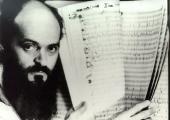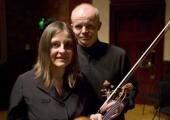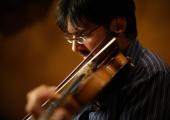Alina Ibragimova, Quay Brothers, Wilton's Music Hall

Young Russian violinist fills magical space and collaborates with visionaries
Nine out of 10 attempts to feed an audience's visual responses to abstract music are doomed to failure; a great communicator will always conjure stronger pictures in the listener's mind. And there's no doubt that young violinist Alina Ibragimova communicates at the highest level. But here she simply held her own to work in shadowplay with both the mysterious spaces of London's most atmospheric venue and the even more intangible visions of twins Timothy and Stephan Quay. Their film around Bartók's Solo Violin Sonata, though defying intellectual analysis and easy correspondence with the musical ideas, is pure choreographic poetry.







